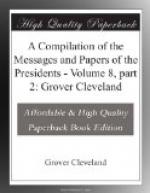A PROCLAMATION.
Whereas great and weighty matters claiming the consideration of the Congress of the United States form an extraordinary occasion for convening them, I do by these presents appoint Monday, the 4th day of November next, for their meeting at the city of Washington, hereby requiring the respective Senators and Representatives then and there to assemble in Congress, in order to receive such communications as may then be made to them, and to consult and determine on such measures as in their wisdom may be deemed meet for the welfare of the United States.
[SEAL.]
In testimony whereof I have caused the seal of the United States to be hereunto affixed, and signed the same with my hand, Done at the city of Washington, the 24th day of July, A.D. 1811, and of the Independence of the United States the thirty-sixth.
JAMES MADISON.
By the President:
JAMES MONROE,
Secretary of State.
THIRD ANNUAL MESSAGE.
WASHINGTON, November 5, 1811.
Fellow-Citizens of the Senate and of the House of Representatives:
In calling you together sooner than a separation from your homes would otherwise have been required I yielded to considerations drawn from the posture of our foreign affairs, and in fixing the present for the time of your meeting regard was had to the probability of further developments of the policy of the belligerent powers toward this country which might the more unite the national councils in the measures to be pursued.
At the close of the last session of Congress it was hoped that the successive confirmations of the extinction of the French decrees, so far as they violated our neutral commerce, would have induced the Government of Great Britain to repeal its orders in council, and thereby authorize a removal of the existing obstructions to her commerce with the United States.
Instead of this reasonable step toward satisfaction and friendship between the two nations, the orders were, at a moment when least to have been expected, put into more rigorous execution; and it was communicated through the British envoy just arrived that whilst the revocation of the edicts of France, as officially made known to the British Government, was denied to have taken place, it was an indispensable condition of the repeal of the British orders that commerce should be restored to a footing that would admit the productions and manufactures of Great Britain, when owned by neutrals, into markets shut against them by her enemy, the United States being given to understand that in the meantime a continuance of their non importation act would lead to measures of retaliation.




